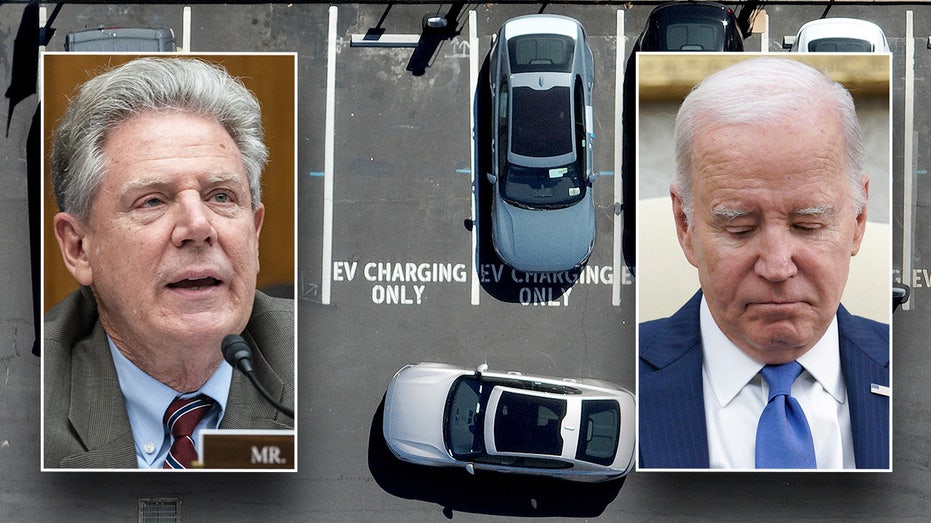House Democratic leaders are circulating an internal memo outlining opposition to Republicans’ effort to prohibit federal electric vehicle (EV) mandates and reverse recent environmental regulations targeting gas-powered cars.
The memo, obtained by Fox News Digital, states the so-called Choice in Automobile Retail Sales (CARS) Act would undermine the Environmental Protection Agency’s (EPA) ability to protect Americans from “dangerous air pollution” and adds such pollution causes thousands of premature deaths every year. The House Rules Committee green-lit the bill earlier this week, teeing up a floor vote Wednesday.
“Democrats are fighting to protect Americans’ right to clean air and a safe climate, protect public health, and support EPA’s mandate to address dangerous pollution from the transportation sector,” the memo states. “Over 100 million Americans live in counties with unhealthy air pollution, with children, the elderly, low income communities, and communities of color being disproportionately at risk. Air pollution is associated with over 100,000 premature deaths in the United States every year.”
“Republicans are employing scare tactics to deliberately mislead the American people about EVs in order to prop up Big Oil corporations,” it continues. “The reality is that EVs are already popular, cheaper to own, and ongoing technological advancements are translating to better options for consumers every year.”
HOUSE SET TO HOLD VOTE ON BILL STRIKING DOWN BIDEN’S EV PUSH: ‘RADICAL AND UNATTAINABLE’
The memo is being circulated by Democrats on the House Energy and Commerce Committee led by Ranking Member Frank Pallone, D-N.J., who has advocated for an aggressive green energy transition.
The CARS Act — introduced over the summer by Reps. Tim Walberg, R-Mich., and Andrew Clyde, R-Ga. — would block regulations the EPA proposed in April that would significantly increase tailpipe emissions standards for gas-powered cars. The bill would also prohibit any rule mandating the use of a specific technology or regulations that limit the availability of new vehicles based on engine type.
FORD DRAMATICALLY SCALES BACK EV PLANT AMID PLUMMETING SALES IN BLOW TO BIDEN’S GREEN ENERGY GOALS
In addition to arguing that continued reliance on gas cars may lead to more premature deaths, the memo pushed back on Republicans’ arguments that the EPA actions amount to an “EV mandate.” It notes that automakers are announcing their own EV manufacturing goals independent of federal regulations.
However, if the EPA rule is finalized, the White House projected that a staggering 67% of new sedan, crossover, SUV and light truck, and up to 50% of bus and garbage truck purchases could be electric by 2032. It also said the new standards would “accelerate the transition to electric vehicles,” likely because it would raise the price of gas-powered cars, making them cost-competitive with pricey EVs.
“Auto Innovators does not believe [the proposed standards] can be met without substantially increasing the cost of vehicles, reducing consumer choice, and disadvantaging major portions of the United States population,” John Bozzella, the CEO of the large auto industry group Alliance for Automotive Innovation which supports EVs, said after the EPA published its proposal in April.
“Taken together, the proposed GHG and criteria pollutant standards are so stringent as to set a de facto BEV mandate,” he added.
Opponents of EPA’s actions — which are part of the Biden administration’s broader effort to increase EV ownership in the U.S. and fight global warming by curbing carbon emissions produced by the transportation sector — have argued the new standards would ultimately harm consumers through higher costs and by forcing them to buy certain vehicles.
STUDY CASTS DOUBT ON ELECTRIC VEHICLES’ CLIMATE, COST BENEFITS: ‘WON’T ACHIEVE THE GOALS INTENDED’
They have also argued that a large EV push will benefit Chinese industry which currently dominates global EV battery supply chains.
“Voting for the CARS Act and taking a stand against EPA’s de facto ban on most new gasoline, diesel, flex fuel and hybrid vehicles should not be a partisan issue for members of the House,” American Fuel & Petrochemical Manufacturers Vice President of Government Relations Aaron Ringel told Fox News Digital. “Banning vehicle and fuel technologies based on just one category of emissions is unlawful, illogical and bad for consumers, families and our national security. It would trade our hard-earned energy security for dependence on China.”
“The CARS Act will preserve consumer choice and allow individuals and families to continue selecting the cars and trucks that work best for them,” Ringel said. “Under this legislation, EPA would retain the ability to set ambitious, technology-neutral vehicle emission standards, but those standards may not be manipulated to force vehicle electrification or limit access to any vehicle powertrains.”
He also cited polling data indicating 60% of Americans oppose the EPA’s proposal. And he took aim at messaging defending the proposal.
“With regard to how some are messaging against the CARS Act, it’s silly to try and spin EPA’s proposal as anything other than a mandate and de facto ban,” he told Fox News Digital. “People across the political and news spectrums acknowledge that the point of EPA’s proposal is to force electrification.”
“But if electric vehicles were really the more affordable, convenient option for consumers and the market, EPA’s proposal wouldn’t be necessary,” Ringel concluded. “The proposal — which will eliminate most vehicle models that run all or in part on American-made, American-grown liquid fuels — is meant to force consumers in a direction they’re not asking to go, toward prices they do not want to pay.”
The White House said in a statement Monday that President Biden would veto the CARS Act if it were passed. If the House approves the bill Wednesday, it will move to the Senate where it has already received bipartisan support.
























